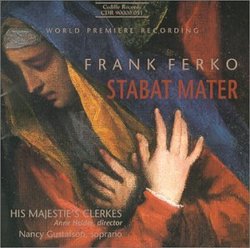| All Artists: Frank Ferko, Nancy Gustafson, His Majestie's Clerkes, Anne Heider Title: Frank Ferko: Stabat Mater Members Wishing: 1 Total Copies: 0 Label: Cedille Release Date: 4/15/2000 Genre: Classical Styles: Opera & Classical Vocal, Historical Periods, Early Music Number of Discs: 1 SwapaCD Credits: 1 UPC: 675754149628 |
Search - Frank Ferko, Nancy Gustafson, His Majestie's Clerkes :: Frank Ferko: Stabat Mater
 | Frank Ferko, Nancy Gustafson, His Majestie's Clerkes Frank Ferko: Stabat Mater Genre: Classical
|
Larger Image |
CD Details |
CD ReviewsOne of Ferko's finest works C. P. Cooman | Cambridge, MA USA | 06/08/2000 (5 out of 5 stars) "This large work for unaccompanied choir is one of the finest works by Frank Ferko, one of America's finest living choral composers. His tremendous talent in writing for choir is displayed vividly in this extended, colorful setting of the traditional Stabat Mater text from the Roman Catholic liturgy. As is typical in Stabat Mater settings, "interpolations" are present which intersperse settings of modern texts along with the traditional ones. Ferko has interpolated four modern texts, all dealing with loss of children -- although viewed in modern contexts such as AIDS. Ferko's sonorities are not easy to sing but are pulled off beautifully by His Majesties Clerkes, one of America's finest choral ensembles and one who has had a long relationship with Ferko's music. A most worthwhile disc. Highly recommended." FANFARE says it all Sally M. Gall | La Jolla, CA USA | 08/12/2000 (5 out of 5 stars) "The July / August 2000 FANFARE review by Lawrence A. Johnson says it all: "The word 'masterpiece' gets thrown around rather indiscriminately at times by music critics . . . Still, if Ferko's Stabat Mater is not a masterpiece, it comes closer to being one than any contemporary composition I have heard in recent years."" A real find for choristers and discriminating listeners Michel Couzijn | Hillegom, Netherlands | 10/03/2003 (5 out of 5 stars) "If you are looking for a new, challenging but highly rewarding acapella choral piece, I can wholeheartedly recommend Frank Ferko's Stabat Mater (1998; about 55 minutes). My (amateur) chamber choir has just pulled off the European premiere here in Amsterdam, The Netherlands, and we are very happy with the result. The work keeps a good balance between modernism and traditional musical language. Thus in spite of its young age the piece communicates well with the audience. We combined it with Fauré's Requiem (an audience pleaser like few others) and guess what: after the concert most people (family, friends, colleagues, you know how it goes) were talking about Ferko's music (and positively! ;-).
Ferko's Stabat Mater consists of twenty-five, quite small parts (1 to 4 minutes), in which many musical techniques are used to convey the sorrow, suffering, and trusting hope of the mother who must see her child die. There are (facultative) interpolations (and one song cycle) for dramatic soprano, on English texts, in which the topic is connected with present day occasions of parents who lose a child because of violence, illness, war. I think that this work deserves a place in the standard repertoire for ambitious choirs. Its difficulty is in the same league as Frank Martin's Mass for Double CHoir, or Poulenc's Figure Humaine. So you need singers who can really hold their own - but good amateurs will do well enough, if I (amateur) may say so. The performance by His Majestie's Clerkes (now Bella Voce) is the only official release on CD. Fortunately, this choir has a very nice tone and scope, and adapts really well to Ferko's demands (except for the occasional 'drop' in intonation, quite common for acappella pieces). The soprano could be a bit more dramatic - yet that is simply a matter of taste. Upon hearing this performance by HMC, I decided immediately that I REALLY WANTED to do this piece with my choir as well. I guess that is the best compliment I could give to Anne Heider's choir." |

 Track Listings (29) - Disc #1
Track Listings (29) - Disc #1